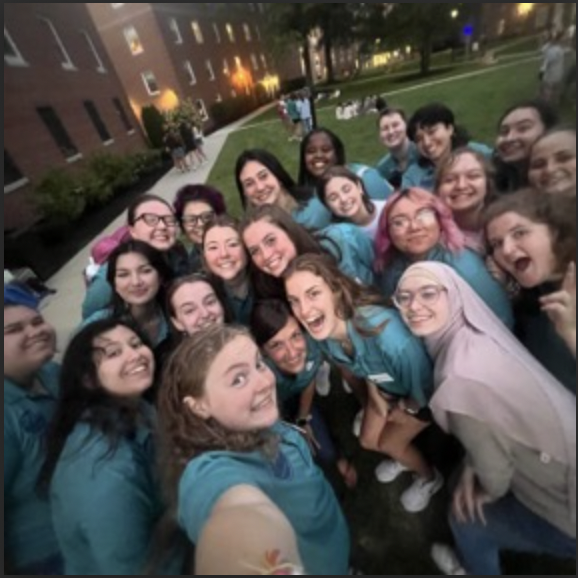By Nicole Veneto
Dear Naomi Wolf,
In response to your op-ed for The Guardian on the vocal fry epidemic among young women (“Young women, give up the vocal fry and reclaim your strong female voice”), I’d like to ask you something. For all your policing of young women’s voices and your demanding that we should give up vocal fry and uptalk for assertive, man-spreading speech patterns, I hope my question meets your criteria for a legitimate strong and empowered female voice worth hearing: Did you even once consider that your misguided criticism might be better aimed at the patriarchal culture that stifles women’s voices into uncertainty or no?
As a young twenty-something in the final stretch of completing her bachelor’s in English, I’m here to paint the lines of the lane that you, a fifty-something living in the comfort of her lucrative career, need to get out of.
To my knowledge, my voice isn’t infected by the Cher Horowitz-esque vocal inflections you believe are keeping my generation from feminist greatness, “disown[ing]” the power that previous generations have apparently blessed us millennials with. But a good chunk of my vocabulary consists of those “like”s, “um”s, and “oh my god”s that you and every other crotchety baby boomer in the world find so flinch-worthy. While Bloomberg says Millennials are the best educated age group in the United States (“Millennials Most-Educated U.S. Age Group After Downturn: Economy”) , I can’t go a day existing without having my words picked apart and presented as evidence that my “just”s and “sorry”s are the sole reason why my generation is so horribly underpaid (“Google and Apple alum says using this one word can damage your credibility” for Business Insider & “Millennials Are the Most Educated, Worst Paid Generation” for Complex). I’m apparently undermining myself in a way that makes me sound uneducated and unconfident to a world of said crotchety baby boomers who determine the economy, legislature, media, and pretty much every aspect of the environment that’ll greet me after graduation.
By the way, your (unconvincing―seriously, try harder) attempt to take responsibility on behalf of older feminists for failing to teach us baby feminists that it’s not our job “to placate” our elders really holds no meaning when you spend every other word telling us to meet your expectations. There were much more radical things to be done between the 60s and 90s than hold feminist charm classes.
I’m not trying to say that I should expect to be hired after answering all questions at a job interview in a knock-knock-joke format, so let’s not take it
to extremes. We of the do-nothi-ng-but-twitter-and-be-triggered generation are quite aware that different social situations call for adjusting the way we communicate. Professional interactions require a level of professionalism in speaking. Same goes for writing. I don’t drop F-bombs in final papers for English classes and I’m not penning this letter to you in MLA format.
But what you’re trying to pass around as empowering feminist advice is nothing but sexist voice-policing, continuing the tradition of silencing and dismissing women’s voices. Women weren’t voiceless before the dawn of the first-wave ― what words we spoke were buried alongside all the Judith Shakespeares and credited to Anonymous if they managed to crawl out of the shallow grave. Those eons of silence were actually eons of silencing. How dare you forget that?
Vocal fry is supposedly dumbing down young women, and yet when Ira Glass, Noam Chomsky, and every other cisdude employ it there’s not even a whimper of criticism (“What is ‘vocal fry,’ and why doesn’t anyone care when men talk like that?” for Upworthy). As Thom Dunn for Upworthy suggests, this whole debate over women’s vocal fry and upspeak is “just another way of trying to define gender roles.” What your friendly feminist advice is really doing is perpetuating the real problem in this situation ― the imperialist, white supremacist, capitalist patriarchy. Our society has provided the context in which certain tones of voices are acceptable for certain genders, races, and classes. One raised pitch or tongue click out of line and an entire identity is invalid. For women of color and women whose first language isn’t English, such criticisms are part of a long process of dehumanization and Othering. For trans women, if their voices don’t pass against a list of standards for femininity, their very lives may be in danger. What our society deems as the correct ways to speak and sound are tied just as much to other -isms as they are to sexism.
After living most of our lives being told it’s better to be seen than heard, that our ideas and identities don’t matter, and that loudness and anger are only good as the butt of a joke, are you really so surprised that we young women have internalized these values and placed a tonal question mark at the end of our sentences?
Or, as spoken word goddess (and Simmons alumnae) Melissa Lozada-Oliva says in her poem “Like, Totally, Whatever” “It’s like maybe I’m so used to speaking in questions because I’m so used to being cut off.”
She explains it better in three minutes than I could ever hope to in a lifetime.
If you truly support my generation, then you’ll give us the microphone. You’ll stop playing the role of the Sea Witch and take your tentacles off our tongues. You’ll judge us based on what we say, not how we sound. And you’ll celebrate our junk words, upspeak, and vocal fry as weapons of revolution to deafen the patriarchy with.
Speak now or forever hold your peace, Ms. Wolf.
With regards,
Nicole Veneto



















